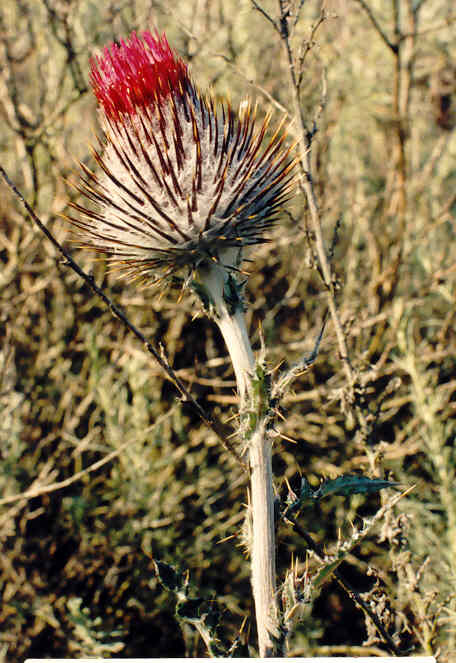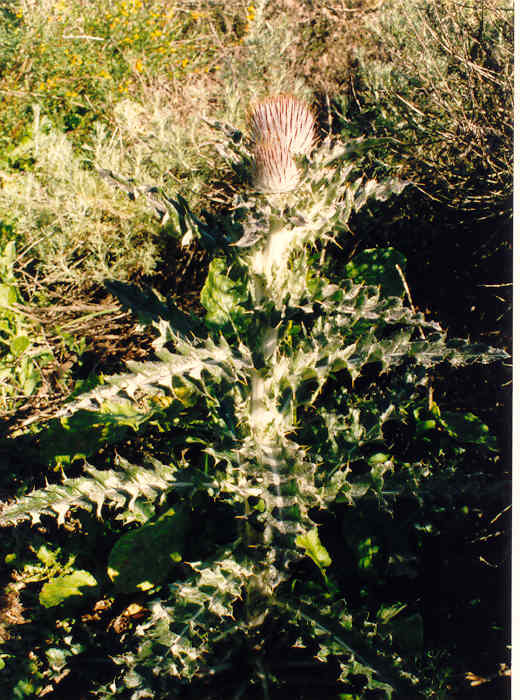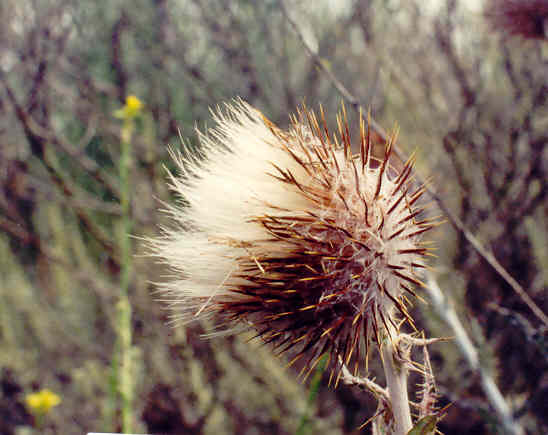
Cirsium occidentale var. venustum
(E. Green) Jepson
Asteraceae (Sunflower Family)
Native
 |
Cirsium occidentale var. venustum
(E. Green) Jepson
Asteraceae (Sunflower Family)Native
Venus Thistle |
April Photo
Plant Characteristics:
Biennial, plants generally 5-30 dm. tall, erect; stems generally 1,
branched above, +/- tomentose; lvs. +/- densely gray to +/- green or rarely
whitish tomentose, especially below; lower lvs. 1-4 dm., petioles spiny-winged,
blade oblanceolate, lobed 1/2 to midvein, lobes widely triangular, dentate or
further lobed, main spines 1-10 mm.; upper lvs. gradually reduced, sessile, +/-
clasping or short-decurrent, linear or oblong, often entire, often spinier than
lower, uppermost lvs. bract-like; heads generally long peduncled, sometimes in
tight clusters at ends of peduncles, well elevated above lower lvs.; involucre
2-6 cm. in diam., subglabrous to densely cobwebby, generally longer than wide;
middle phyllary tips 5-20+ mm., generally 2-3 mm. wide, ascending to rigidly
spreading or reflexed; corollas 23-35 mm., generally +/- red (white, pink,
purple).
Habitat:
North County Ranges, southern Sierra Nevada, White and Inyo Mts.
southward. Generally more inland
than var. occidentale but some plants
from San Francisco bay region not readily separable. (Hickman, Ed. 238).
Name:
Cirsium, Greek for thistle.
(Hickman, Ed. 232). Latin, occidentalis,
western. Latin, venustus, charming,
elegant. (Jaeger 170,279).
Cirsium occidentale var. venustum,
elegant western thistle. (my
comment).
General:
Rare in the study area having been found
in only one location and this on the bench below Eastbluff North.
There were three plants noted in this location.
(my comment).
The pale swallowtail, Papilio eurymedon, feeds on the flower nectar of this
plant. Frankie, Gordon, "Introduction" (FREMONTIA, A Journal of the California Native Plant Society Vol.
30 Nos. 3-4 July-Oct. 2002 p.3,4. Intergrades with var. candidissimum in the Klamath Ranges, North Coast Ranges and
High Sierra Nevada, and with var.
californicum in southern and central Sierra Nevada and South Coast Ranges.
Plants with pale corolla sometimes difficult to separate from var.
californicum. (Hickman, Ed.
238). About
200 species, North America and Eurasia. (Hickman,
Ed. 232).
Text Ref:
Hickman, Ed. 238.
Photo Ref:
Mar-April 95 # 11,32; April 95 # E; April-May 95 # 2; May-July 95 # 9A.
Identity: by R. De Ruff, confirmed by John Johnson.
First Found: March 1995.
Computer Ref: Plant Data 484.
Have plant specimen.
Last Edit 5/21/04.
 |
 |
March Photo October Photo